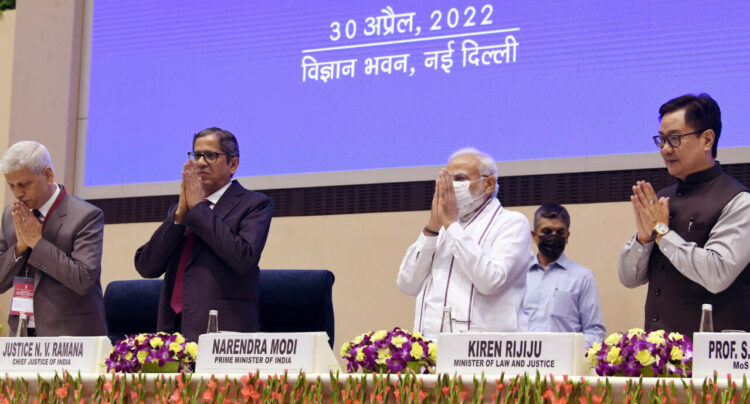Rashtriya Swayamsevak Sangh (RSS)-inspired Siksha Sanskriti Utthan Nays on Sunday (SSUN) (May 1) welcomed Prime Minister Narendra Modi’s suggestion of using local languages in courts.
SSUN General Secretary Dr. Atul Kothari said that for the last few years, the SSUN has been working to ensure people get justice in their own languages. Under the programme, Bharatiya Bhasha Abhiyan, the organisation has been continuously working for inclusion of local languages in court proceedings.
“In the past, President Shri Ram Nath Kovind and Vice-President Shri M Venkaiah Naidu have also advocated the use of local languages for the court proceedings. Taking forward the prime minister’s suggestion of April 30, this should be brought to a conclusion,” Dr. Kothari said.
He appealed to the Supreme Court and the High Courts to fast-track the suggestions made in the conference about the use of regional languages in court proceedings.
In June 2015, SSUN Chairperson Dina Nath Batra had demanded the use of Indian languages for all legal, judicial, government, financial and civil service examinations.
Addressing a press conference in June 2015 after a meeting of the SSUN board where a resolution was passed for promotion of Indian languages, Dr. Kothari had said, “The use of Indian languages would enhance the people’s understanding of these transactions in a better way. Petitions, hearings and judgments at the district courts now use the regional language, but most High Courts and the Supreme Court stick to English. Indian languages must get priority.”
Inaugurating the joint conference of chief ministers and the chief justices in Delhi’s Vigyan Bhavan on Saturday (April 30), PM Modi said, “A large population finds it difficult to understand the judicial process and rulings of the court. There is a need to simplify this and make it accessible. We must encourage the use of local languages in courts. This will ensure that the common man has faith in the judiciary and can feel part of the system.”
Union Law Minister Kiren Rijiju later addressed a press conference with CJI NV Ramana. In response to a query from The Indian Express, the minister said, “We are very positive towards encouraging the use of local languages in the judiciary. It’s a process which requires wider consultation with the judiciary. For usage of languages in the court, not only for arguments but also for orders, judgments, we require the approval of the Chief Justice of India. That is why it needs wider consultation, and we will definitely have very positive consideration in this matter.”
CJI Ramana, while welcoming the suggestion about the use of local languages in court proceedings, counted the hurdles to be cleared before the suggestions see the light of the day.
CJI Ramana said, “As of today, Hindi is the medium of language in most states… Earlier, a request came, if I remember, when I joined the Supreme Court… That was rejected by the Full Court of the Supreme Court. Thereafter, no concrete proposal came before the Supreme Court asking for allowing regional languages. Recently, this regional language issue has started. It has not reached… It has to come from various levels to the Supreme Court… It will take some time… There are lots of hurdles, bottlenecks, hiccups in the implementation of regional languages in High Courts.”
“The reason is sometimes some of the judges are not familiar with the local language. The Chief Justice will always be from outside. The most senior judge will also sometimes be from outside. Secondly, we don’t have that much technology or systems to translate the entire record to the local language or local language to English. And logistics support is the biggest problem in implementing this. To some extent, artificial intelligence is some way out,” he added.




















Comments